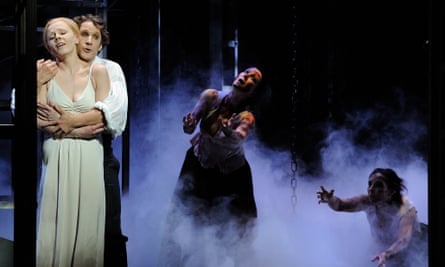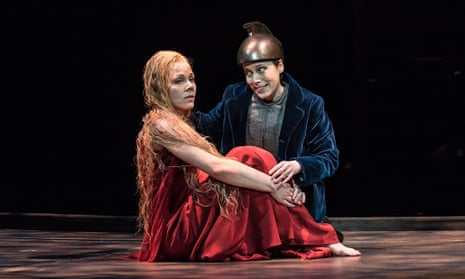Closely based on Maeterlinck’s once-famous play, this opera by Debussy is set in the mysterious, quasi-medieval kingdom of Allemonde, where nothing is quite what it seems. Mélisande in particular is a notoriously enigmatic character, whose evasiveness – if not outright deceit – fuels the atmosphere of uncertainty that Debussy underscores with his enchantingly ambiguous music.
In David Pountney’s production, some things are made specific that are less clear-cut in the original, while layers of mystery are added. Johan Engels’ unit set is a revamp of the cage-like structure the late designer provided for Pountney’s 2013 production of Berg’s Lulu, with metal chains hanging from the flies and the top half of a skeleton looming over a central spiral staircase. Marie-Jeanne Lecca’s costumes are a ragbag of styles and periods, though they suggest the time of the opera’s inception in the 1890s.

Pountney sees Mélisande, like Lulu, as a femme fatale, though the explicit sexualisation of her encounters with the blind, elderly Arkel and his great-grandson Yniold would be hard to support from either the text or the music. A sinister figure wearing a bull’s skull, who appears at the beginning and end, suggests a cycle in which Mélisande is a sort of spirit who endlessly dies only to be reborn. She finally vanishes with the group of women who have made silent appearances throughout, her baby turning out, after her mother-in-law Geneviève unwraps its shawl, to be nothing but dust.
Yet even if one feels that the last thing Debussy’s masterpiece needs is more enigmas, no one will argue with the musical quality of this production, which is superb. Jacques Imbrailo inhabits Pelléas’ shy tentativeness, with his high baritone finely deployed. Jurgita Adamonytė’s mezzo gives Mélisande more warmth than usual, though she retains her fragile fascination. Christopher Purves exemplifies Golaud’s aggression and nagging doubts, while Leah-Marian Jones’ Geneviève delivers her famous letter scene with subtle conviction.
The palm, though, must go to Welsh National Opera’s orchestra and conductor Lothar Koenigs, who carefully explore with the expressive range of one of the most magical of all operatic scores.

Comments (…)
Sign in or create your Guardian account to join the discussion